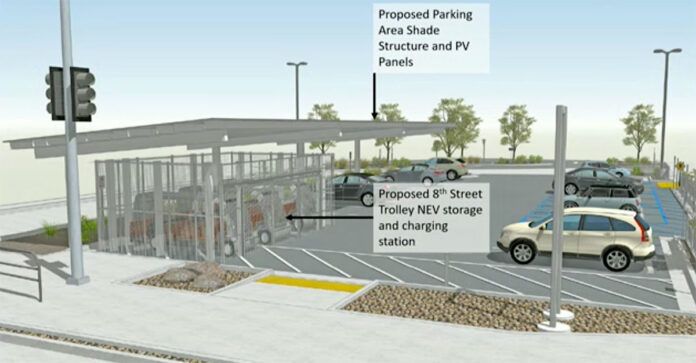Back in August 2021, National City Mayor Alejandra Sotelo-Solis announced a new system of electric vans used to connect people from public transportation to common destinations was coming to National City. On Dec. 6, City Council formally adopted a resolution to accept the $999,996 state grant intended to establish and operate the Free Ride Around National City program for the first three years.
The state-funded Clean Mobility Options Voucher Program is an initiative of the California Air Resources Board intended for underserved communities.
The CMO grant was originally slated for two electric neighborhood vehicles which resemble small commuter vans and recharging for the NEVs, along with 10 electric bikes and 10 electric scooters with a charging station, a cage for overnight storage, and solar panels on parking shade structures.
However, in light of increased construction costs throughout the state, National City had an opportunity to apply for an additional $500,000 in funding to see the project through and in doing so, updated the request to eliminate the bikes and scooters and instead purchase one more NEV.
The city will not know until spring 2023 whether their request for additional funding has been approved but is moving forward with the program.
According to their operational schedule, the city expects the CMO grant to pay for set up in year one of the program as well as all operations in years two and three.
Years four and five will be funded by the city, potentially through advertisement revenue, development fees, partnership, fairbox returns, unspecified grants and support from San Diego Association of Governments.
When the program was initially announced at city hall in 2021, SANDAG Executive Director Hasan Ikhrata said the FRANC enterprise is “exactly what we mean when we talk about the Five Big moves,”and indicated the regional planning group supported the concept, but did not publicly commit to funding the program.
During the Dec. 6 meeting, Council member Ron Morrison said the city is “on the hook” to provide for years four and five but might be able to utilize TransNet funding.
TransNet is a half-cent sales tax administered by SANDAG to fund local transportation projects in the San Diego region which support the general plan.
National City Director of Public Works and City Engineer Roberto Yano said the projected costs for years four and five was originally estimated at $219,000 in 2020 but inflation could double that projection as the next few years develop.
“The project has been through many delays because of insurance requirements and negotiations that need to occur. The program is expected to be available to the public by summer of 2023 although construction of the full charging facility could be extended into fall,” Yano said.
While funding is being established, Yano said, the city has continued to work on the project and is currently developing route ideas based on current battery technology and potential driver scheduling.
Generally, the three NEVs are expected to provide first and last mile connection between downtown, Old Town, the west side, the marina and the 8th street trolley station on a fixed route during peak commuter hours with on-call service the remainder of the day.
National City resident Larry Emerson asked whether other charging stations around the city such as the one at Las Palmas park could be utilized to extend the service area. Yano said the grant will fund a dedicated solar-powered charging system that is essentially free to use while other stations around town are “pay to play” and would likely end up costing the city.
Mona Rios said she recognizes the system was set up for the first and last mile and intended to help people get to public transit, but she would like to see the on-call portion of the program go toward helping seniors on the east side of the city connect with the trolley.
Resident Joan Rincon loosely compared the program to a Chula Vista program which she said is basically an on-call shuttle system for senior citizens.
“First, thought should be given to converting all or part of the program for seniors. Secondly, I think we all recognize that the Pepper Park area is lacking in transportation and it would be helpful if something went that direction,” Rincon said.
Noting the tentative FRANC route forms a loop, Rincon said the city should consider incorporating Las Palmas park so seniors could travel between Paradise Village, the senior nutrition center and the new senior center without using step-up buses that sometimes conflict with mobility issues.
“As we learn how to best serve our residents with specific routes, we’ll be adapting those routes to better serve the city,” Yano said.
A motion to adopt the resolution passed unanimously.

